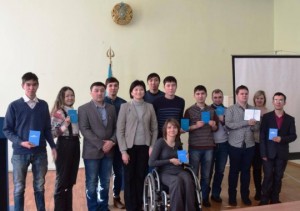Earlier this year, the Senate of Kazakhstan approved the bill “On the Ratification of the Convention on the Rights of Persons with Disabilities.”
The United Nations Development Programme UNDP, under a UN Joint programme in the East Kazakhstan Oblast (EKO) has done a lot to create a barrier-free environment for disabled people. The inclusion of our two employees in the Coordinating Council of the Akimat of the EKO on a barrier-free environment is recognition of the programme’s efforts in the region. Today, we would like to talk about how we are creating a favourable environment for people with disabilities. It is about our projects, training and employment of people with disabilities, made possible in part by the EKO Department of Employment and Social Programmes Coordination.
From the beginning of the programme’s onset, we have been conducting training courses for future employment for the disabled under the framework of the UN Joint Programme in East Kazakhstan. Just over the past year, 17 people with impaired vision learned the basics of the massage industry; 22 have been trained in basic design. Today, our graduates work in the massage room and studio through the Voluntary Society for Persons with Disabilities. They are able to provide computer and printing services. This success would not have been achieved without our close work with our local partners.
The cost of training and organisation was covered by the UN Joint Programme in the EKO which also equipped offices with appropriate equipment that meets all current legislative requirements. The department provided facilities for this project.
Students who successfully complete the training course on design will be helped in opening a business and finding employment thanks to the Employment Roadmap 2020 state programme. At present, students can gain experience and expand their customer base in the business incubator through the Voluntary Society of Disabled People for People with Disabilities where they are given an office, computer equipment and furniture.
These courses were organised under the UN Joint Programme in the EKO to improve access to social and economic services in conjunction with the department. Participants were enrolled in the course after successful psychological, medical and pedagogical exams. To date, students have shown excellent results after only two months. According to one participant, Anna Mazayeva, participants will now continue to improve their Photoshop and Corel skills. At the certificate ceremony, Aizhan Sadykova, the department head, expressed gratitude to the UNDP for its bold ideas and projects in creating an enabling environment for people with disabilities.
The Convention on the Rights of Persons with Disabilities was signed by Kazakhstan on Dec. 11, 2008. The convention aims to protect and promote the rights of persons with disabilities, eliminate discrimination against the disabled and ensure the full participation of people with disabilities in society. Each signatory state should use all of its resources for this purpose and should take all measures available to implement the convention and to consult with other nations. Kazakhstan is well positioned to implement the convention and has an appropriate regulatory framework, but perhaps this is not enough to fully ensure the rights of people with disabilities. We believe that such projects on training and employment can be implemented anywhere, in any region of the country if desired. To do this, we are ready to share success stories and our accumulated experience.
The Convention on the Rights of Persons with Disabilities was approved by the General Assembly of the United Nations in 2006. At present, the Convention has been ratified by 151 countries, including a number of countries in the Commonwealth of Independent States.
The UN Joint programme in the EKO, “Raising the Competitiveness of the Region through Innovative Approaches to Regional Planning and Social Services (using Semey as an example model)”started in 2011. The purpose of this programme is to improve the quality of life and make progress towards achieving the Millennium Development Goals in the East Kazakhstan region, in particular, in areas severely affected by the nuclear tests at the Semipalatinsk nuclear test site. The programme is designed to meet the needs of the population and socio-economic needs in the East Kazakhstan region. The UN joint programme in the EKO is being implemented in partnership with the Government of Kazakhstan and UN agencies such as the UNDP, UNICEF, the United Nations Population Fund and the United Nations Volunteers programme. Based on the successful model of the joint programme in improving the quality of life of the population in July this year, similar joint programmes in the Kyzylorda and Mangistau oblasts have been launched.
The authors are a Programme Communication Specialist at the UNDP office in Astana and a Manager at the UNDP office in Semey

